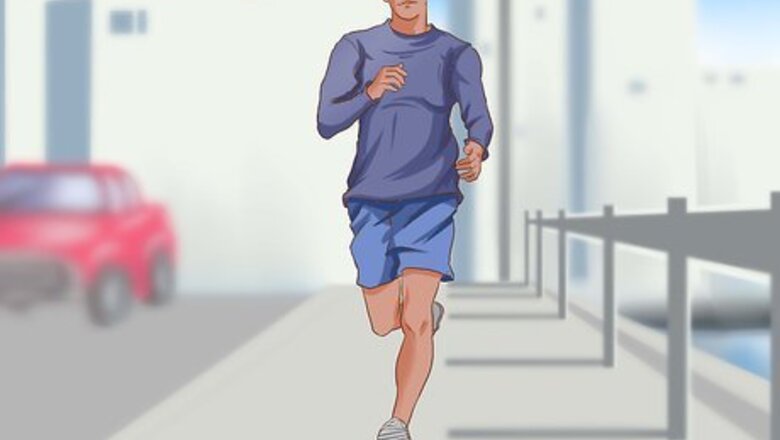
views
Developing a Positive Lifestyle

Take care of yourself. Raising your self-esteem first and foremost means setting aside time and attention for yourself. Showing that you value yourself is a first step in learning to see how others value you. Make sure that you do things like: Get plenty of exercise Develop a daily routine for yourself that makes you feel good, such as taking a bubble bath at the end of the day or going for a walk in the afternoon. Gain a new skill or hobby, develop a talent, or just learn about subjects that interest you. Feel good about where you live! Set aside time to clean and decorate your home, even in simple ways.
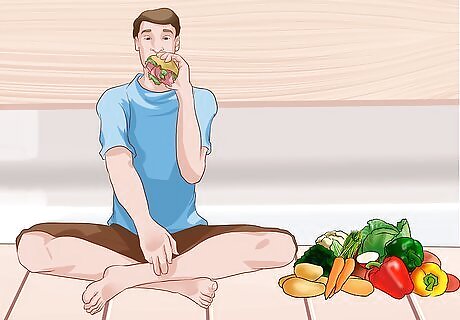
Eat healthy. To feel good, you need to be well-nourished. This means eating a balanced diet. Some nutrients, such as vitamin D and vitamin B12, can even give your mood an additional boost. Good sources of vitamin D include salmon, dairy products, and fortified juices. Good sources of vitamin B12 include liver, fortified cereals, and dairy products.
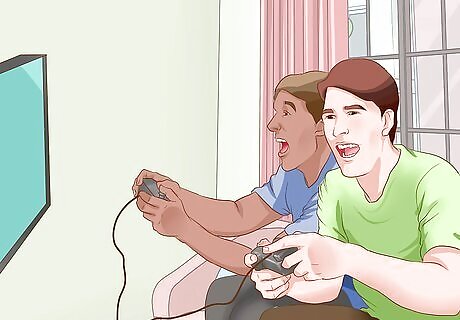
Take time to do things you enjoy. Low self-esteem can cause a great deal of stress. If you set aside time for things that you like doing, however, you can relieve some of this stress and connect with your sense of self-worth. Read a book, use a musical or artistic talent, go to the movies or a game, spend time with friends—whatever you enjoy!

Accomplish something. Problems with self-esteem are often tied to feelings that you are unsuccessful. A good antidote for this feeling is setting and meeting a goal of accomplishing something. Even small accomplishments will make you feel more confident and successful. Doing things to improve the appearance and comfort of your home can be a great place to start: cleaning your home, clearing out a closet, decorating, etc. Taking care of low stress, low stakes tasks like running errands or going to the grocery store can also make you feel good about accomplishing something. You can also set your sights on accomplishing long-term goals, such as lowering or eliminating debt, learning a new skill, losing weight, etc.
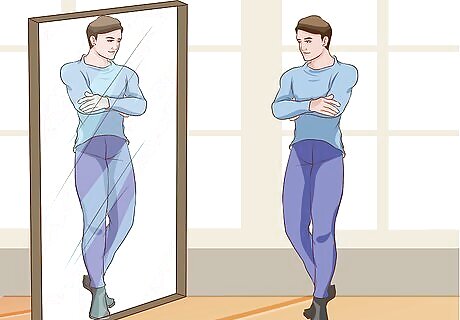
Dress well. While image should not be your primary motivation, considering your appearance can have a positive effect on your self-esteem. This doesn’t mean that you need to buy expensive clothes, however. Dress in whatever clothing you have that makes you feel confident, and your inner feeling will project outwards!
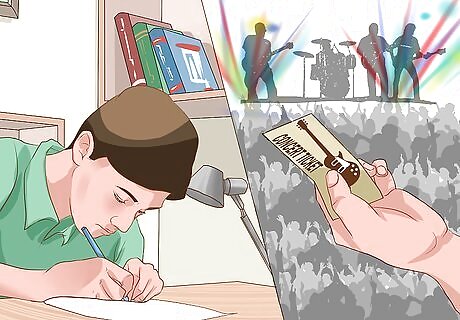
Give yourself rewards. You can show that you value yourself if you let yourself have something special now and then. Giving yourself a reward shows that you care about everything you do, especially if the reward comes after working really hard at something. Rewards don’t have to take the form of material things. You can also reward yourself with experiences. For instance, you could go to a concert after completing a big project at work or school.

Spend time with good people. If you want to boost your self-esteem, then surround yourself with people who are positive, supportive, and kind. Avoid people who are negative, mean to you, or seem to hold you back.
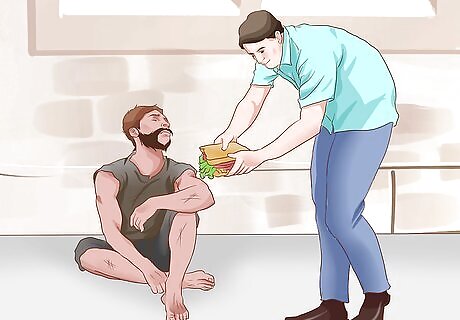
Practice kindness. If you are struggling with feeling good about yourself, try doing something nice for someone else. You will feel good that you helped someone out. Showing that you care about others also boosts your expectations that others should care about you. Try: Practicing random acts of kindness, such as paying for a stranger’s meal. Visiting a friend or relative who is sick. Helping neighbors with yard work. Volunteering for good causes in your community.
Acknowledging Your Good Qualities

Make positive lists. Taking time to consider positive aspects of your life can be an instant boost to your self-esteem. By surrounding yourself with good thoughts, you will push negativity out of your mind. Try making lists of: Things you are thankful for Your good qualities (such as kindness, patience, and thoughtfulness) Strengths or talents you may have (such as a good work ethic, intelligence, artistic or musical abilities, skills in an academic or professional area, etc.)

Try a mutually complimentary exercise. Sit down with a friend, family member, or someone else you trust. Take turns offering each other compliments or describing good qualities that the other person has. This simple exercise will boost your own self esteem and the other person’s

Keep a “positive scrapbook.” Make a collection of things that celebrate you and your good qualities. These might include photographs, letters, awards, souvenirs of places you have been, and other reminders of positive things in your life. Make sure to add to keep adding to it, and look it over when you feel like your self-esteem needs a boost. This doesn’t have to take the form of an actual scrapbook. Any kind of collection will do, such as a box or display shelf.

Make a self-esteem calendar. Take a calendar, and for each day, schedule a small thing you can do to make yourself feel better. These can include things like “Make my favorite meal,” “Call my friend,” or “Go for a walk in the park.” Check off the things you accomplish each day, and reflect on how you feel afterwards.
Creating a Positive Attitude
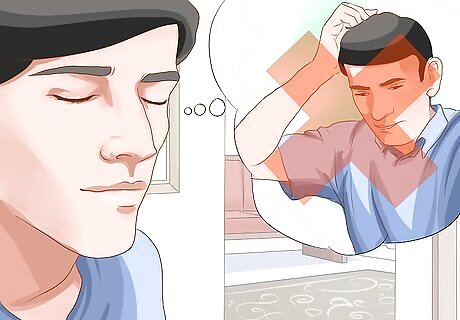
Turn negative thoughts around. Problems with self-esteem often arise due to some external stressor or crisis. While you might not be able to prevent this, you can have some control over how you think about things. When you feel negative thoughts popping up, stop and turn them into something more positive. When you think something self-critical (such as “I’m so stupid”), ask yourself questions like: “Is it true? Would I say it to/about someone else? Do I gain anything by thinking this? What would I gain if I stopped thinking this way?” Focus on subtly rephrasing thoughts so that they put more emphasis on how to view a situation positively. For instance, instead of thinking “I won’t let myself be so distracted at school any more,” try saying to yourself “I am going to develop my work ethic.” Try this simple exercise. Fold a piece of paper in half. On one side, write any negative thoughts you may have about yourself. On the other side, write a corresponding positive thought to replace each negative one.

Accept some failure. No one can succeed at everything all of the time. Failure is a part of life. You can, however, recognize and feel good about your effort when you try hard at something. You can also think about how you can learn from mistakes. For instance, if you don’t do well on an exam (even if you studied hard), take a moment to recognize your effort. You probably did better than if you hadn’t studied at all, and you can review your mistakes to find out how to improve in the future.
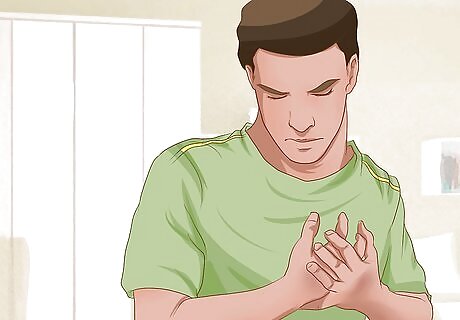
Listen to yourself. Your body and mind often suggest what you need to do, and listening to your needs can help you feel better. This might mean something as simple as getting more sleep if you feel tired. However, listening to yourself also means trusting and following your thoughts and instincts. For instance, if you find yourself constantly thinking about moving to be closer to family, that might be something important for you to do.

Don’t compare yourself to others. Life is often very competitive, but it is important to set standards for yourself rather than trying to match everyone else.Recognize that everyone isn’t the best at everything, and that each person has individual strengths. If you feel like you want to improve some aspect of your life, make a goal of doing it for yourself, and don’t worry about what others do or think. For example, if you want to develop your abilities in a sport like basketball or tennis, set a goal that you think would be a personal improvement, rather than just trying to match or beat someone else.

Find support. If you feel you have a problem with self-esteem, you don’t have to handle it alone. Good friends and family will be happy to make you feel better, spend time with you, and share your good qualities. You can also find a support group or counselor in your area to work with and find ways to develop your self-esteem.

Identify the source of the problem. Knowing what causes you to feel low self-esteem can help you combat the problem. Sometimes, specific causes can be hard to identify, but common triggers include: A high-stakes situation, such as a major project at work or school Significant changes in personal or professional life, such as the end of a relationship or the loss of a job A crisis, such as illness, injury, financial problems Bullying Negative perceptions of body image




















Comments
0 comment